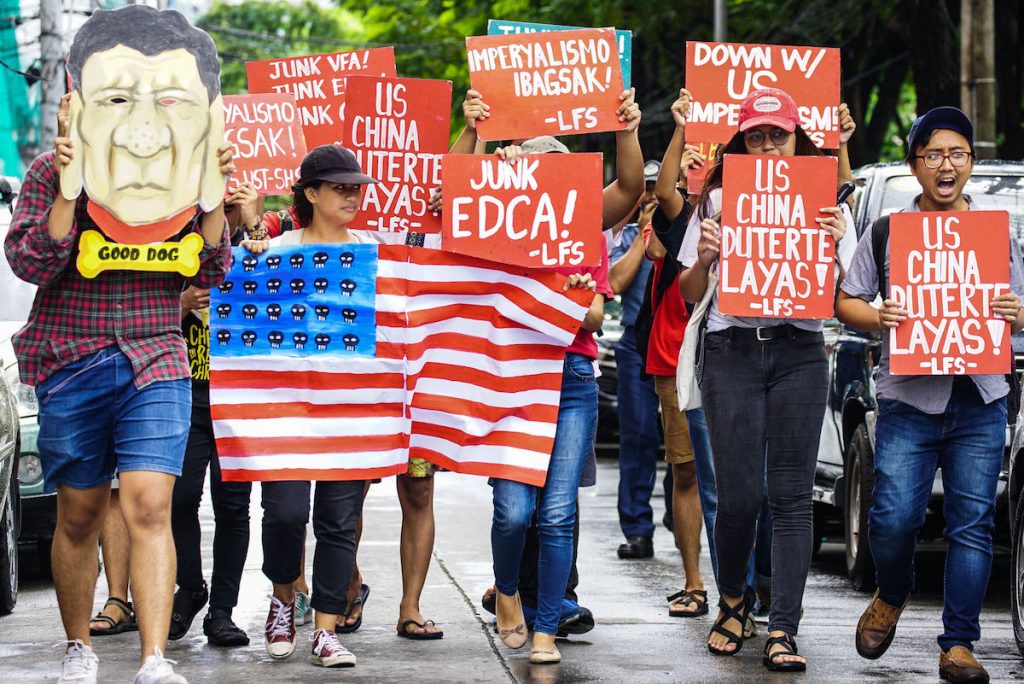Philippine church leaders warned against “serious consequences” over Manila’s recent decision to terminate a military defense deal with the United States.
The Philippines officially informed Washington on Feb. 8 that it is terminating the Visiting Forces Agreement between the two countries.
Philippine President Rodrigo Duterte said the country “cannot forever rely on other countries” for the state’s defense and should instead strengthen its own resources “for our defenses.”
The move was welcomed by activist groups that have been calling for the abrogation of the deal, but several Catholic bishops warned of possible consequences.
Bishop Jose Elmer Mangalinao of Bayombong said the government had “simply disregarded whatever benefits” the agreement gives to the country in pushing ahead with its decision to sever ties.
He warned that the Philippines “will be risking the lives of many” by terminating the agreement on what he called “flimsy and whimsical” grounds.
President Duterte ordered the termination of the deal after the U.S. government cancelled the U.S. visa of Senator Ronald dela Rosa, the president’s former police chief and close ally.
U.S. authorities cited the Global Magnitsky Human Rights Accountability Act for the decision, having linked the official in alleged extrajudicial killings.
Dela Rosa implemented the president’s “war on drugs,” which rights groups say has resulted in the death of over 27,000 people.
The Philippine presidential palace, however, said the decision to terminate the Visiting Forces Agreement was not made on a whim. Rather, the president said the move had come as a studied response to acts that the president deems are not merely an intrusion, “but an assault on the sovereignty of this country.”

U.S. President Donald Trump said on Feb. 13 that he was not concerned with the Philippines terminating the agreement.
“If they would do that, that’s fine. We’ll save a lot of money,” said Trump, adding that the U.S. military “came in literally and single-handedly” to help the Philippines end the Marawi siege in 2017.
Meanwhile, Bishop Ruperto Santos of Balanga warned of “serious and significant consequences” in the abrogation of the deal.
The bishop called on congress to deliberate with and advise Duterte on the matter.
Bishop Valentin Dimoc of Bontoc-Lagawe said the decision to terminate the agreement should have been made “through serious discernment by responsibility bearers.”
Retired Bishop Arturo Bastes of Sorsogon likewise described the termination of the deal as “unfortunate and ill-advised.”
He said Duterte should be “humble enough to listen” instead of “reacting childishly” to criticism.
Bishop Bastes said the result of the “immature personal reaction” of the president could compromise national security.
The communist rebel group National Democratic Front of the Philippines (NDFP), however, welcomed the president’s decision.
Fidel Agcaoili, an NDFP peace negotiator, said termination of the deal is “long overdue,” although he warned that there is no guarantee that Duterte will not “flip-flop once more as he has often done in the past.”
“He has no credibility and I don’t believe in his much-ballyhooed popularity. Let’s see in the next six months what will happen,” said Agcaoili.
The Visiting Forces Agreement, which the Philippines ratified in 1999, grants legal status to visiting American military personnel in the country.
Activists oppose the agreement because of provisions that include non-restrictive visa and passport policies for American soldiers and U.S. government jurisdiction over its soldiers who commit crimes in the Philippines.









